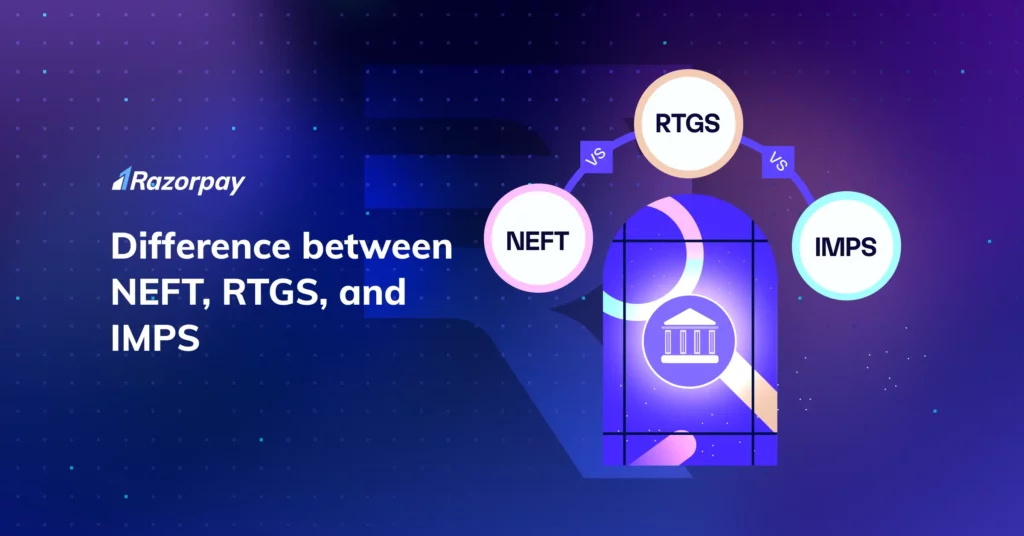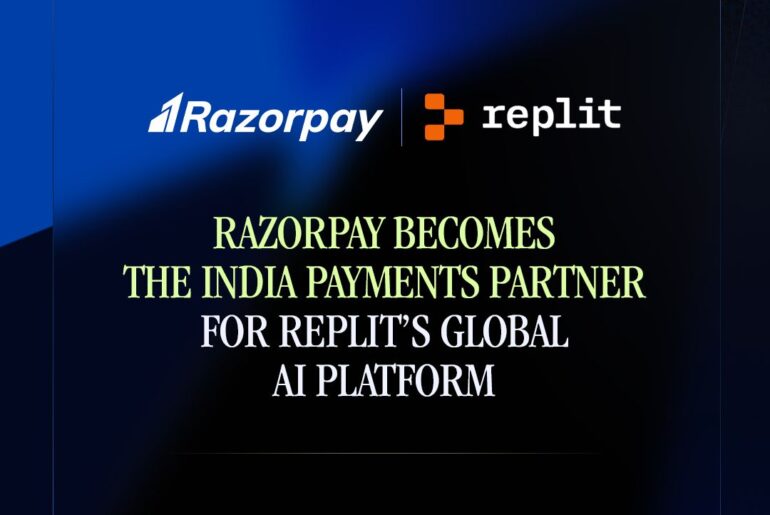Table of Contents
What are IMPS, NEFT, and RTGS?
IMPS, NEFT, and RTGS are three widely used electronic fund transfer systems in India, each serving different purposes. IMPS (Immediate Payment Service) enables instant, 24/7 money transfers between bank accounts, making it ideal for urgent transactions. NEFT (National Electronic Funds Transfer) processes batch-based settlements within a few hours, allowing individuals, businesses, and organizations to transfer funds across banks in India. RTGS (Real-Time Gross Settlement) is designed for high-value transactions with immediate and individual settlement, ensuring secure and quick fund transfers.
Related Read: SBI RTGS Charges Explained: Fees, Limits & Timings
Difference Between NEFT vs RTGS vs IMPS
To better understand NEFT vs RTGS vs IMPS, let’s examine the table showing NEFT vs RTGS vs IMPS difference:
Basis |
NEFT |
RTGS |
IMPS |
| Minimum and Maximum Transfer Values | NEFT allows transfers starting from Rs. 1, with no upper limit. | RTGS has a minimum transfer value of Rs. 2 lakhs and no maximum limit. | IMPS transactions can begin as low as Rs. 1 and are capped at Rs. 5 lakhs. |
| Settlement Type and Speed | NEFT operates as a batch settlement system where transfers are processed in batches and subject to cut-off timings. | RTGS is a one-on-one settlement system that ensures immediate fund transfer upon initiation. | IMPS also operates on a one-on-one settlement basis, allowing for instantaneous transfers. |
| Service Availability | NEFT operates 24/7, providing round-the-clock accessibility for users. | RTGS availability varies based on individual bank hours, which may restrict user’s access to the service during certain times of the day. | IMPS is accessible 24/7, accommodating users’ transaction needs at any time. |
| Mode and Process | NEFT can be used both online and offline, offering you flexibility in choosing your preferred transfer mode. | RTGS can be used both online and offline, offering you flexibility in choosing your preferred transfer mode. | IMPS transactions are conducted exclusively online through internet banking or mobile banking applications. |
| Transaction Speed | NEFT transactions are relatively slower than RTGS and IMPS transfers. The processing time for NEFT can take up to 2 hours. | RTGS transactions are faster than NEFT, with funds typically being credited within 30 minutes. | IMPS enables instant transactions, allowing for immediate fund transfers. |
| Transaction Charges | NEFT does not levy charges for inward transactions or online processes. The outward charges for NEFT transactions vary from Rs. 2.5 to Rs. 25 based on the transfer amount. | RTGS also does not levy charges for inward transactions or online processes. The outward transactions charges range from up to Rs. 25 plus GST for transfers between Rs. 2 lakhs to Rs. 5 lakhs and up to Rs. 50 plus GST for transfers of Rs. 5 lakhs and above. | The charges for IMPS transactions may vary among different banks. |
| Reliability | NEFT is considered reliable and secure for fund transfers. | RTGS is considered reliable and secure for fund transfers. | IMPS is considered reliable and secure for fund transfers. |
Related Read: SBI IMPS Charges 2025
1. NEFT (National Electronic Funds Transfer)
NEFT is a one-to-one payment facility that allows individuals, businesses, and organisations to transfer funds electronically between banks offering NEFT-enabled services.
Different from real-time payment systems like RTGS and IMPS, NEFT transactions are processed in batches and usually take up to 2 hours to complete. This characteristic is particularly important when it comes to third-party transactions, as the delayed processing may affect the time it takes for the funds to be transferred between the sender, the intermediary banks, and the recipient.
However, since December 2019, NEFT timings has been available 24*7, meaning you can initiate transactions anytime. To transfer funds through NEFT, Log in to Internet banking – Select NEFT transfer – Add beneficiary details – Verify and approve beneficiary – Initiate fund transfer.
There are no limits on the amount that can be transferred via NEFT. The NEFT transactions charges vary from Rs. 2.5 to Rs. 25 based on the transfer amount. NEFT payments are processed in batches of half an hour as per RBI guidelines.
Related Read: How to Check NEFT Transaction Status?
2. RTGS (Real-Time Gross Settlement)
RTGS is a real-time interbank fund transfer system operated by the Reserve Bank of India (RBI). It allows individuals and businesses to make high-value transactions with immediate settlement. The safety and security of RTGS transactions are ensured due to its management by the RBI.
RTGS operates one-to-one; each transaction is settled individually in real time.
Since July 01, 2019, RBI waived RTGS processing charges, potentially benefiting customers at banks’ discretion. RBI mandates banks to follow specific RTGS charge frameworks, including free inward transactions and capped fees from ₹25 to ₹50 for outward transactions. You can initiate RTGS transfers online through Internet banking or offline by visiting your bank branch.
RTGS timings is available throughout the year at any time and is ideal for large-value transactions where immediate settlement is required. The legal backing of RTGS transactions minimises the risk of fraud and ensures trust and reliability.
Related Read: How to Do Fund Transfer Using RTGS?
3. IMPS (Immediate Payment Service)
IMPS is an instant interbank electronic funds transfer service that operates in real time. It allows users to transfer funds up to a maximum daily limit of Rs. 5 Lakh. The IMPS transaction charges range from Rs. 5 to Rs. 15, depending on the conditions set by the respective bank.
You may also encounter additional service tax charges on IMPS transactions. IMPS offers 24/7 inter-bank fund transfer convenience, making it highly accessible and convenient. It is safe, efficient, and economical.
IMPS can be accessed through both Internet banking and mobile platforms, eliminating the need for physical bank visits and even account numbers. It is available even during public holidays and bank closures. The payer and the payee receive immediate transaction notifications from the bank upon completing an IMPS transaction.
IMPS can be used for various purposes, such as receiving payments, making merchant payments, conducting mobile banking transactions, and more.
Related Read: How to Transfer Money Using IMPS?
How to Choose Between IMPS, NEFT and RTGS?
When comparing NEFT vs RTGS vs IMPS for your fund transfer needs, there are a few key factors to consider.
1. Transaction Speed
Transaction speed varies between these payment charge methods. NEFT transactions are processed in half-hourly batches and can take up to a few hours to complete. RTGS transactions are processed individually and are usually completed within a few minutes. On the other hand, IMPS allows for real-time funds transfer, ensuring instant transactions.
2. Fees and charges
IMPS, NEFT and RTGS charges should also be considered when selecting the best option for yourself. NEFT transactions are generally affordable, with nominal charges that vary based on the amount transferred. RTGS transactions usually have higher charges compared to NEFT due to their faster processing time. IMPS charges can vary depending on the bank or payment service provider.
3. Network compatibility
Lastly, considering network compatibility is also essential. All banks and financial institutions across India widely accept NEFT. RTGS is available only for large-value transactions and requires both the sender’s and receiver’s banks to be part of the RTGS network. IMPS can be accessed through various platforms such as mobile apps, internet banking, SMS banking, payment links, and ATMs.
Related Read: Difference Between IMPS vs NEFT
Important Things to Consider Before Initiating a Fund Transfer
Here are some crucial things to consider before initiating a fund transfer:
-
Fund Transfer Limits – IMPS allows transactions up to ₹5 Lakhs, RTGS is ideal for transfers above ₹2 Lakhs, and NEFT has no upper limit, offering flexibility for all amounts.
-
Transfer Speed – IMPS and RTGS process transactions instantly, making them suitable for urgent payments, while NEFT takes a few hours, making it ideal for non-urgent transfers.
-
Transaction Fees – NEFT has the lowest charges, IMPS charges nominal fees, while RTGS fees range from ₹25 to ₹50 based on the transfer amount. Inward transactions are free across all networks.
-
GST on Fees – An 18% GST applies to transaction fees for all three payment methods, impacting the overall transfer cost.
-
Bank Network Compatibility – The sender and receiver banks must support the chosen payment method for a successful transfer. IMPS, for example, requires both banks to be on the IMPS network.
Frequently Asked Questions (FAQs)
1. What are the most common methods of online money transfer?
The most common methods of online money transfer in India include NEFT, RTGS, IMPS and UPI. NEFT is a secure and efficient method for transferring funds between bank accounts. RTGS is used for high-value transactions, with funds being settled in real time. IMPS and UPI allow for instant fund transfers using mobile phones.
2. Which is better: NEFT or RTGS or IMPS?
The choice between NEFT, RTGS, and IMPS depends on the transaction amount and urgency. For low-value transactions under ₹2 lakhs, NEFT is suitable as it is cost-effective and has no minimum transaction limit. RTGS is ideal for high-value transactions above ₹2 lakhs that must be settled immediately. IMPS is the fastest option, allowing instant fund transfer 24/7.
3. Which is faster: IMPS or NEFT?
IMPS is faster than NEFT as it provides instant fund transfer options. With IMPS, you can send money instantly to any bank account anytime, even on weekends and holidays. NEFT transfers are processed in batches throughout the day and typically take a few hours.
4. How long does an RTGS transfer take?
RTGS transfers are settled in real time, and the funds are credited to the beneficiary’s account within 30 minutes of initiation.
5. Is RTGS available 24 hours?
Starting from December 14, 2020, RTGS services are available around the clock, 365 days a year. This significant change allows real-time, secure fund transfers anytime, including weekends and holidays.


